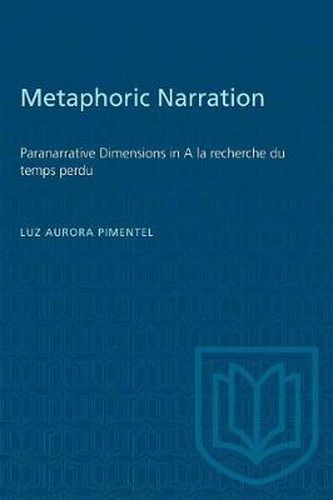Readings Newsletter
Become a Readings Member to make your shopping experience even easier.
Sign in or sign up for free!
You’re not far away from qualifying for FREE standard shipping within Australia
You’ve qualified for FREE standard shipping within Australia
The cart is loading…






Readers of Proust are aware of the special place that metaphor has in his work, both as his passport to immorality and as an instrument for discovery. Countless books and articles have been written on his stylistic use of metaphor, but very few have described its role in the text’s organization.
Luz Aurora Pimentel begins with the proposition that metaphor should operate beyond – or below – the observable verbal texture of a narrative. Such an abstract level of functioning in the process of metaphorization considerably affects narrative structure as a whole and generates a sort of paranarrative, or virtual subsidiary narrative line, that must be constructed by the reader. To examine this abstract potential Pimental uses both theory and criticism.
She divides the book into two major sections; the first examines the role of metaphor in narrative discourse in order to establish a theory of metaphoric narration; the second applies this theory to Proust’s A la recherche du temps perdu. The author demonstrates a thorough knowledge of modern literary theories of metaphor, including those of Genette, Greimas, Ricoeur, Ricardou, and Riffaterre, while fashioning her own original view of the role of metaphoric narration. Her book can be read with profit not only by those interested in Proust but also by those concerned with literary theory and metaphoric narration in general.
$9.00 standard shipping within Australia
FREE standard shipping within Australia for orders over $100.00
Express & International shipping calculated at checkout
Readers of Proust are aware of the special place that metaphor has in his work, both as his passport to immorality and as an instrument for discovery. Countless books and articles have been written on his stylistic use of metaphor, but very few have described its role in the text’s organization.
Luz Aurora Pimentel begins with the proposition that metaphor should operate beyond – or below – the observable verbal texture of a narrative. Such an abstract level of functioning in the process of metaphorization considerably affects narrative structure as a whole and generates a sort of paranarrative, or virtual subsidiary narrative line, that must be constructed by the reader. To examine this abstract potential Pimental uses both theory and criticism.
She divides the book into two major sections; the first examines the role of metaphor in narrative discourse in order to establish a theory of metaphoric narration; the second applies this theory to Proust’s A la recherche du temps perdu. The author demonstrates a thorough knowledge of modern literary theories of metaphor, including those of Genette, Greimas, Ricoeur, Ricardou, and Riffaterre, while fashioning her own original view of the role of metaphoric narration. Her book can be read with profit not only by those interested in Proust but also by those concerned with literary theory and metaphoric narration in general.